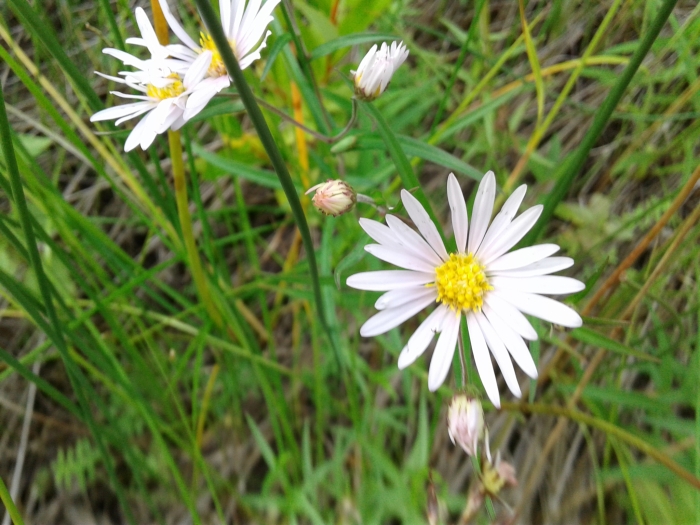Rush Aster
(Symphyotrichum boreale)
Rush Aster (Symphyotrichum boreale)
/
/

Quinten Wiegersma
CC BY 4.0
Image By:
Quinten Wiegersma
Recorded By:
Copyright:
CC BY 4.0
Copyright Notice:
Photo by: Quinten Wiegersma | License Type: CC BY 4.0 | License URL: http://creativecommons.org/licenses/by/4.0/ | Rights Holder: Quinten Wiegersma | Publisher: iNaturalist | Date Created: 2018-08-20T15:16:40-07:00 |

























Estimated Native Range
Summary
Symphyotrichum boreale, commonly known as Rush Aster or Northern Bog Aster, is a perennial herb that is native to a variety of wetland habitats including fens, marshes, and wet meadows in northern North America, from Alaska to Newfoundland and extending south to Colorado and West Virginia. It typically grows to a height of 5-33 inches (13-84 cm) and features a clumping habit with narrow, lance-shaped leaves. The Rush Aster blooms from late summer to early fall, producing clusters of daisy-like flowers with white to pale purple ray florets surrounding cream to pale yellow disk florets, which are attractive to pollinators such as bees and butterflies.
This species is valued for its ability to thrive in wet, calcareous conditions and is often used in native plant gardens, rain gardens, and for naturalizing in moist areas. It requires consistently moist to wet soil and full sun to part shade. While it is not commonly known for aggressive growth, its rhizomatous nature allows it to spread and fill in areas, making it useful for erosion control. Gardeners should be aware that in optimal conditions, it may spread more than desired. It is relatively low maintenance but can be susceptible to powdery mildew in crowded or poor air circulation conditions.CC BY-SA 4.0
This species is valued for its ability to thrive in wet, calcareous conditions and is often used in native plant gardens, rain gardens, and for naturalizing in moist areas. It requires consistently moist to wet soil and full sun to part shade. While it is not commonly known for aggressive growth, its rhizomatous nature allows it to spread and fill in areas, making it useful for erosion control. Gardeners should be aware that in optimal conditions, it may spread more than desired. It is relatively low maintenance but can be susceptible to powdery mildew in crowded or poor air circulation conditions.CC BY-SA 4.0
Plant Description
- Plant Type: Herb
- Height: 1-3 feet
- Width: 1-2 feet
- Growth Rate: Moderate
- Flower Color: Pink, Purple, White
- Flowering Season: Summer, Fall
- Leaf Retention: Semi-deciduous
Growth Requirements
- Sun: Full Sun, Part Shade
- Water: Medium
- Drainage: Medium
Common Uses
Border Plant, Butterfly Garden, Low Maintenance, Water Garden
Natural Habitat
Variety of wetland habitats including fens, marshes, and wet meadows
Other Names
Common Names: Northern Aster, Rush Aster, Rush Or Slender White Or Northern Bog Aster, Rush-Like Aster, Slender White Aster, Boreal American Aster, Boreal Aster
Scientific Names: , Symphyotrichum boreale, Aster aestivus, Aster borealis, Aster eminens, Aster franklinianus, Aster junciformis, Aster laxiflorus var. borealis, Aster laxifolius var. borealis, Aster longifolius var. eminens
GBIF Accepted Name: